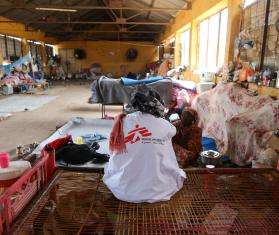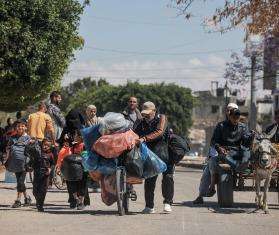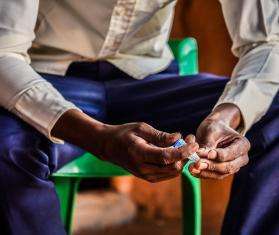WEBCAST: Wednesday, June 6, 2018
The Trump administration’s reinstatement of the Global Gag Rule has alarmed women’s health advocates around the world. Also known as the Mexico City Policy, the Global Gag Rule cuts US funding to organizations working overseas that provide abortion-related services, referrals, or even information about reproductive choices. The sweeping new version introduced last year applies to all US-funded global health assistance. These restrictions now threaten programs providing everything from maternal and child health care to treatment for malaria.
MSF does not accept US government funding so is not directly affected by this policy, however many health providers we work with are reeling from the impact. Every day, our teams work to save the lives of women who arrive at our clinics after having unsafe abortions—one of the leading causes of maternal mortality. The Global Gag Rule will have devastating effects on women and children all over the world and threatens decades of progress on global health.
Watch our panel of experts from MSF and Marie Stopes International on June 6 for a discussion on the impact of the new Global Gag Rule.
What's so scary about the Global Gag Rule?
Panelists
Catrin Schulte-Hillen began working with MSF in 1989 as a midwife, then went on to serve as a project coordinator and project manager for MSF interventions around the world. Catrin has also been program director for MSF-USA and worked for several years as a health advisor and consultant on a number of assignments for MSF, other NGOs, and for the European Commission. In her current role as MSF’s working group leader for reproductive health and sexual violence care, she contributes to defining MSF’s vision, medical policies, and strategies, and to improving our quality of care in this area.
Dr. Manisha Kumar is the coordinator of MSF’s task force on safe abortion care. The task force aims to increase access to contraceptive and safe abortion care services via direct field support to MSF projects. Manisha has spent the past 16 months based in the Democratic Republic of Congo (DRC) and will be supporting the transition of the task force to MSF movement-wide efforts in the coming years. She has also worked as a medical coordinator for MSF in Bangladesh and DRC.
Dr. Rasha Khoury is an emergency obstetrician with MSF and fellow in maternal fetal medicine at Montefiore Medical Center in New York. Rasha’s research and clinical work centers around reducing maternal morbidity and mortality by improving access to high-quality, safe abortions and contraception, along with antenatal, delivery, and postpartum care among at-risk populations (including women of color, women living in poverty, and women surviving displacement and war). Her work with MSF has taken her to Afghanistan, Iraq, Lebanon, Ivory Coast, and Sierra Leone. Rasha identifies herself primarily as a humanitarian aid worker and social justice activist.
Katy Footman is a senior researcher at Marie Stopes International focusing on safe abortion and post-abortion care. She manages Marie Stopes’ global portfolio of abortion research, led the development of the organization’s safe abortion and post-abortion care strategy, and supports the translation of evidence into policy and programs. Katy has worked in research, monitoring, and evaluation at Marie Stopes for four years, and previously conducted research on maternal health and health systems strengthening at the London School of Hygiene and Tropical Medicine.
Moderator
Melissa Pracht, Senior Producer, MSF-USA.




